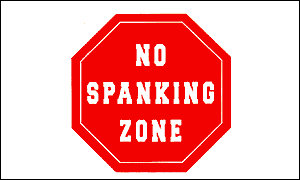Californians want 'no-spanking' zones

Campaigners want to put signs in public places
Campaigners against corporal punishment for children in California want to put up 'No-spanking zone' signs in public places.
Parents and Teachers Against Violence in Education, which wants to end the use of physical punishment in schools and in the home, is proposing that Oakland City Council should put up the large red signs in places such as public parks and libraries.
These signs, in the style of no-smoking signs, would be intended to make parents who use corporal punishment think again. "At the moment, people are whipping and beating and hurting their children with nobody telling them what they are doing is wrong and dangerous," said campaign organiser Jordan Riak.
"Today one cannot hit a dog in public without provoking the ire of bystanders, or even risking arrest. But when someone hits a child, in most places it passes unnoticed."
The signs, which would not have any legally enforceable status, are part of an ongoing dispute in the United States between those for and against corporal punishment, with 27 states, including California, having banned its use in schools.
Bruising
Parents and Teachers Against Violence in Education highlights cases of what can happen when physical punishment is allowed in the classroom, including claims last month that a teacher in Georgia had been suspended for washing out a pupil's mouth with soap and that another teacher had badly bruised a pupil in the course of punishment.
According to the National Coalition to Abolish Corporal Punishment in Schools, over 100,000 incidents of corporal punishment were recorded in Texas in a single year, although as a proportion of the student population more pupils in Arkansas were physically punished.
In a number of European countries, including Sweden, Norway and Denmark, the use of any corporal punishment for children has been outlawed, both in the home and in school.
In the UK, legislation passed last year banned it in all schools, and following a European Court ruling, the government plans to clarify the existing law on smacking which allows parents to use "reasonable chastisement" against their children.
Last September, the European Court of Human Rights ruled that the British law on corporal punishment in the home failed to protect children's rights, after considering the case of a boy who, between the ages of five and eight, had been beaten by his stepfather with a three-foot garden cane.